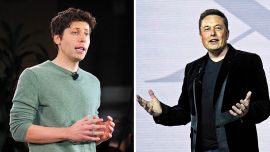Javier Milei will be rounding out his first year in government with a degree of acceptance which many of us believed to be impossible. Despite the austerity, more than half of Argentina look kindly on him while slightly less than half eye him askance. Much the same happens with his administration – some La Libertad Avanza officials and leaders have a positive balance in the polls while opposition leaders, whether doves or hawks, are in bad shape.
Vice-President Victoria Villarruel has the best image among the country’s politicians but her star will probably fade due to her confrontation with the President. The popularity, the likes and dislikes and the votes all belong to Milei and to nobody else. For the moment he is the only valid leader in Argentine politics, the one who takes the initiative and defines the agenda. The others have faded, except Cristina Fernández de Kirchner whose presence helps him as a backdrop.
Milei, for his part, has been on a learning curve while developing the syndrome of hubris, fostered by a novice court perceiving itself as omnipotent and eternal. But that is not exclusive to this government – it’s a universal phenomenon. The enthusiastic presidential entourage believe that their power is eternal with hubris leading them to error. This Greek word signifies arrogance and overblown egos, the opposite of sobriety and moderation. The Hellenes believed that it offended their gods, who sent Nemesis, the goddess of retribution, to punish the egomaniac and bring about his downfall.
The post-pandemic leaders have some things in common. Before all else, the new leaders look different from the traditional. One way of knowing who might be the surprise winner of an election would be to find out who is the candidate most different from the traditional politicians in the race. The ideologies and the programmes do not matter – whoever communicates that they embody change have the best possibilities of positioning themselves.
It is difficult for politicians and traditional analysts to understand how the new political communication works since it has little to do with the texts and content of the speeches and much to do with the forms and show. It doesn’t matter if the words are incoherent, what communicates is the body language and the stage setting, which is what draws the attention of the citizenry. It might seem easy to do but it is not. Some politicians have tried to win elections making fools of themselves on social networks and instead of winning votes, they have come across as clowns.
Intelligence and sophistication are needed for success in this new type of politics and both Milei and Donald Trump have it. They are personalities with the capacity to react rapidly to unforeseen situations in a striking and original way, making a connection with the common people. They convert defeats into triumphs.
Their image is transparent, picturesque, intolerant and at the same time fun. They play astutely at personifying David. When Sergio Massa bullied Javier Milei, he won the debate, but the libertarian aroused the solidarity of the people and took the votes. If members of the caste attack Milei, he comes across as Robin Hood against powerful evildoers. The more imprecise that “caste” is, the better. They are all evil, not just one individual; it’s a universal conspiracy, not just personal spite. Trump and Milei know that the Goliaths have difficulties winning elections in the horizontal society of the Internet and that tough leaders need to boost their image with elements of humility and simplicity.
Trump did not fry chips at a McDonald’s because that’s his idea of fun, but to appear among the people as an authentic candidate showing up Kamala Harris as an imposter when she said that she had worked at that chain. During the campaign and in the presidency, Milei knew how to express sentiments and wear his emotions on his sleeve, singing, dancing and seeming to lose control all the time. Even when he threatens others, his message has something funny about it, akin to the announcements of the “armed arms” of Argentine politics, La Cámpora and Las Fuerzas del Cielo, whose soldiers, we know, have no idea where to find weapons but rather upmarket cars.
The opposition and the allies, both hawks and doves, are confused. They do not know whether to confront or collaborate. If they face up to Milei, they become demoralised and if they support him unconditionally, they will be gratuitously absorbed.
A new order has imposed itself in the West, not as the result of a theoretical debate but due to the invasion of mobile telephones, the GPS, computers, and the development of technology, which is the most important political fact of the period. The younger leaders express this new society naturally and the voters spot who is on the ball and who outdated.
There are issues which move us who lived through the Cold War when Communism confronted the West and much of humanity believed that the end of capitalism had arrived. That was all over in 1990. The horses drawing the coach of the socialist Cinderella turned into mice with the collapse of revolutionary dreams and all countries adopting capitalism, except one hunger-stricken island in the Sargasso Sea, eating only thanks to the charity of world capitalism.
Russia reconstructed its perennial retrograde czarism, Iran again became an obscurantist power governed by fanatical clerics wanting to slaughter most of the species. China became a capitalist country advancing with giant steps without the limitations of a monotheism which preaches the existence of a human nature invented by God who created us in his image and semblance. Heirs of the atheistic Confucian philosophy, instead of believing in God, the Chinese are becoming gods themselves.
In Latin America, the last attempt at change, the socialism of the 21st century, has reached its last gasp. The military dictatorships along those lines have failed. Daniel Ortega is leading Nicaragua into poverty and changing the Constitution in a bid for eternal power amid a growing unpopularity. Nicolás Maduro is an international disgrace. With an arrest warrant issued by Interpol, he was incapable of covering up the fraud permitting him to stay in power.
In Bolivia, Luis Arce has the worst acceptance figures we have seen in decadas. Former president Evo Morales maintains his following but is embroiled in a disagreeable scandal, accused of having sex with the underaged, as he himself confirmed when he acknowledged the paternity of the child of a 15-year-old girl.
In Ecuador, the confrontation of traditional politicians against Daniel Noboa – the youngest president to be elected in the country’s history – is total. Traditional leaders of every tendency have allied to destabilise the government, promoting chaos, aided by the revolutionaries of the past century and a vice-president accused of corruption who cannot enter United States territory. Nervous because of their probable defeat, the opposition is trying to destabilise Noboa, backed by some ex-presidents whom I know and whom I could never imagine backing Rafael Correa, such as Vicente Fox, Mauricio Macri, Jorge ‘Tuto’ Quiroga and current Paraguayan president Santiago Peña.
In both countries, without a military dictatorship to keep them in power by force, the socialism of the 21st century is attempting a coup.
In Argentina the conviction of Cristina Fernández de Kirchner and her image, the incarnation of ancient politics, are helping Milei. Intelligently, he has challenged her to a debate to polarise society against her, in a scenario which would amply favour him.
The main leaders of 21st-century socialism resemble one another – they have courtroom problems, maintaining a core popularity of around 30 percent, and they assist the triumph of their adversaries because in their respective countries, 60 percent of the electorate say that they would never vote for them.
This trend, which combined socialist ideas with religious and animistic superstitions, was an oxymoron. Karl Marx would never have spoken to little birds nor promoted the Nicaraguan amethyst religion nor defended religious theses denying women’s rights.
The backlog of the Cold War, the liberal ideas developing in the second half of the 20th century and also the hip-hop socialism of recent years have installed in our societies a “political correctness” which has ended up sparking rejection. Some ideas which motivated the youth of 50 years ago remain valid, such as the struggle for civil rights, the equality of women, sexual diversity, the battle for the life and dignity of animals, but they were exaggerated and manipulated by activists, provoking the conservative tide we are now experiencing.
Rebellious ideas, in the heads of authoritarian minds, which are then installed in the establishment, are a recipe for disaster. Entities created to defend the new rights become commissars who persecute opponents and a business racket for militants of the ruling party. “Political correctness” sought to install itself by law. Those who decided how many people disappeared during the dictatorship came to be politicians, not historians.
The election of Milei marks a radical shift in Argentine history. Many things moving those of us who lived through the turbulent decade of the 1970s do not exist for the generation which has come to power. Not true that the new politicians in their 40s are too young, the truth is that we others follow a reality of 50 years ago.
We need to retool everything, integrating political analysis with mobile telephones, artificial intelligence, Photoshop and the vision of the world of people who interrelate looking at screens and WhatsApp messages, turning away from real faces.
* Professor at George Washington University. Member of the Club Político Argentino.


























Comments